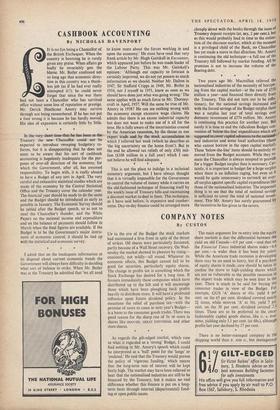CASHBOOK ACCOUNTING
By NICHOLAS DAVENPORT * * * In the very short-time-that he has been at the Treasury the new- Chancellor could not be expected to introduce sweeping budgetary re- forms, but it is disappointing that he does not seem to be aware that his sort of cashbook accounting is hopelessly inadequate for the pur- poses of over-all direction of the economy, for which the Government, after all, has assumed responsibility. To begin with, it is really absurd to have a Budget of any sort in April. The very careful and exhaustive statistical studies which are made of the economy by the Central Statistical Office and the Treasury cover the calendar year. The financial year should be made to do the same and the Budget should be introduced as early as possible in January. The Economic Survey should be tabled after the Budget speech, so as not to steal the Chancellor's thunder, and the White Papers on the national income and expenditure and on the balance of payments should follow in March when the final figures are available. If the Budget is to be the Government's major instru- ment of economic control, it should be tied up with the statistical and economic survey.
* * * I admit that on the inadequate information at its disposal about current economic trends the Government will always have difficulty in deciding what sort of balance to strike. When Mr. Butler was at the Treasury he admitted that 'we all need
to know more about the forces working in and upon the economy.' He must have read that very frank article by Mr. Hugh Gaitskell in Encounter, which appeared just before he was made leader of the Labour Party. This was Mr. Gaitskell's opinion: 'Although our capacity to forecast is certainly improved, we do not yet possess as much information as we should. Neither Mr. Dalton in 1947, Sir Stafford Cripps in 1949, Mr. Butler in 1954, nor I myself in 1951, knew as soon as we should have done just what was going wrong.' The same applies with as much force to Mr. Thorney- croft in April, 1957. Will the same be true of Mr. Amory in 1958? He can see nothing wrong with the economy except excessive wage claims. He admits that there is an excess industrial capacity but does not want to make use of it all for the time. He is fully aware of the uncertainties created by the American recession, by the threat to our export- trade, and by the stock accumulation to which I referred last week (which he describes as `the big uncertainty on the home front'). But in the end he allowed tax reliefs of only £504 mil- lion (£108 million in a full year) which I can- not believe he will find adequate.
* * This is not the place to indulge in a technical monetary argument, but I have always thought that it is virtually impossible for the Government to control the volume of money while it carries on the old-fashioned technique of financing itself by the weekly issue of Treasury bills and maintaining a discount market to deal in them. This technique, as I have said before, is expensive and cumber- some. Day-to-day finance could be arranged more cheaply direct with the banks through the issue of Treasury deposit receipts (at, say, 2 per cent.), but as this would probably lead in time to the extinc- tion of the discount market, which at the moment is a privileged child of the Bank, no Chancellor has yet made a move in that direction. Mr. AmorY is continuing the old technique—a full use of the Treasury bill followed by market funding. All he promises is not to increase the volume of the floating debt.
Two years ago Mr. Macmillan relieved the nationalised industries of the necessity of borrow- ing from the capital market—at the rate of £350 million a year—and financed them directly from the Treasury. This did not turn out to be infla• tionary, for the national savings increased and with the forced savings of the Budget surplus there was a surplus last year of total savings over domestic investment of £374 million. Mr. AmorY is continuing this practice for another year. But surely it is time to end the ridiculous Budget con' vention of 'below-the-line' expenditures which are supposed Iacover capital advances to the national" ised industries and some local authorities (those who cannot borrow in the open capital market). These 'below-the-line' items should be entirely re' moved from the Budget accounts. While they re- main the Chancellor is always tempted to provide for a bigger Budget surplus than is necessary. Cer- tainly, it is important to budget for a large surplus when there is an inflation raging, but even so it would be quite unnecessary to earmark an over- all surplus against specific capital expenditures like those of the nationalised industries. The important thing is to see that the total of national saving is sufficient to cover the total of national invest ment. This Mr. Amory has surely guaranteed b the incentives he has given to the savers.




























 Previous page
Previous page